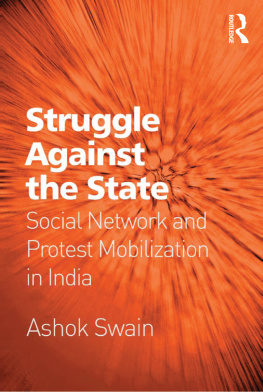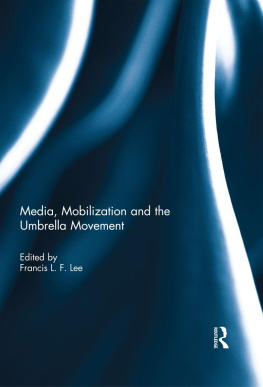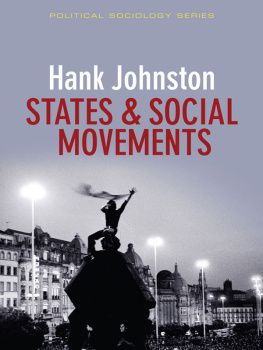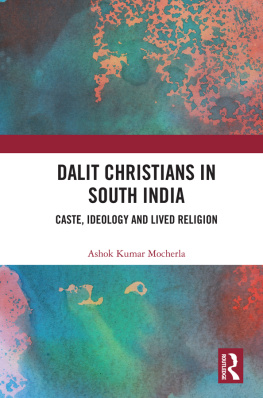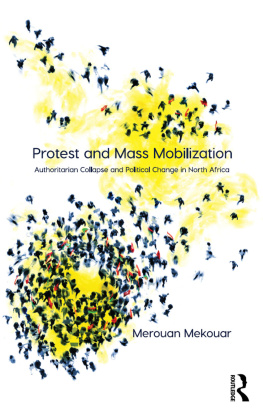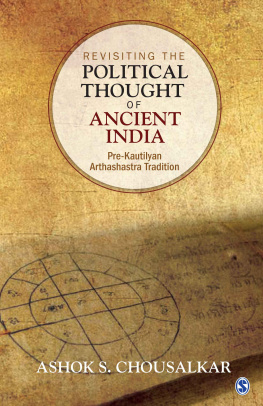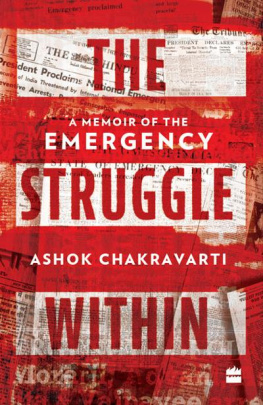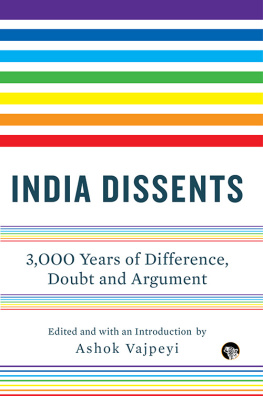STRUGGLE AGAINST THE STATE
To Ranjula, and our children, Kabir and Simran
Struggle Against the State
Social Network and Protest Mobilization in India
ASHOK SWAIN
Uppsala University, Sweden
First published 2010 by Ashgate Publishing
Published 2016 by Routledge
2 Park Square, Milton Park, Abingdon, Oxon OX14 4RN
711 Third Avenue, New York, NY 10017, USA
Routledge is an imprint of the Taylor & Francis Group, an informa business
Copyright 2010 Ashok Swain
Ashok Swain has asserted his right under the Copyright, Designs and Patents Act, 1988, to be identified as the author of this work.
All rights reserved. No part of this book may be reprinted or reproduced or utilised in any form or by any electronic, mechanical, or other means, now known or hereafter invented, including photocopying and recording, or in any information storage or retrieval system, without permission in writing from the publishers.
Notice:
Product or corporate names may be trademarks or registered trademarks, and are used only for identification and explanation without intent to infringe.
British Library Cataloguing in Publication Data
Swain, Ashok.
Struggle against the state : social network and protest mobilization in India.
1. Protest movements--India. 2. Communication in social action--India. 3. Pressure group members--Social networks--India. 4. Social structure--Political aspects--India.
I. Title
322.4'0954-dc22
Library of Congress Cataloging-in-Publication Data
Swain, Ashok.
Struggle against the state : social network and protest mobilization in India / by Ashok Swain.
p. cm.
Includes bibliographical references and index.
ISBN 978-1-4094-0867-3 (hardback)
1. Protest movements--India. 2. Social networks--India. 3. India--Politics and government--1977- I. Title.
JQ281.S93 2010
322.40954--dc22
2010009586
ISBN 978 1 4094 0867 3 (hbk)
ISBN 978 1 3156 1109 9 (ebk)
Contents
List of Tables
Preface
The rise of social movements in the West in the late 1960s and early 1970s triggered the scholarly debate on the origins and outcomes of this process. In fact, the formation of social movements is shaped by the kind of state they face. The state, unique among other social institutions, seeks to standardize its own set of rules to supersede other institutional hierarchies that exist within the family, clan, race, cast, tribe, community or the market. As Joel S. Migdal writes, Since the beginning of the contemporary state system in the fifteenth to seventeenth centuries change has moved towards accepting an axiom that the state organization should provide the predominant (if not exclusive) set of rules of the game in each society (Migdal 1988: 14). The capacity to exert control over other social forces has been a defining feature of the state. The works of Karl Marx and Max Weber, which have been the foundation of two main traditions in modern social science, argue that the state as an institution monopolizes the legitimate use of violence and organized coercion in society (Grindle 1996).
Throughout history humans have dissented about the things they loathed; or else, as Sunstein argues, unchecked by dissent, conformity can produce disturbing, harmful and sometimes astonishing outcomes (Sunstein 2003: 1). The rules which structure interactions between the state and other components of society are continuously being contested and often being restructured. States as well as societies vary in their abilities to restructure this interaction process and their struggle and accommodation produce a range of outcomes (Migdal 1994). The state may dominate social forces altogether and penetrate at all levels; it may completely fail to influence society and collapse, and it may indulge in incorporating each others concerns and demands.
Protest can be classed as an opposition to a particular government agency or just a regular parliamentary process. Moreover, due to their values and dependence on popular support, democratic elites more often respond favourably to the demands of various associations, which tend to enhance future protests. liberty to do so is supposed to be guaranteed by law and tradition. Authorities in democracies usually refrain from using the full strength of their coercive power against popular mobilization and group formation due in part to the fact that the state as an actor is often not altogether or directly involved in the conflictual issues in democracies from the beginning. Even a peaceful protest by few thousand residents compelled US Navy in 2003 to cease their exercises and practice bombing of Puerto Rican island, Vieques (McCaffrey 2002). As the discussion suggests, there is a greater probability both of the occurrence of higher number of protests and of positive outcomes in the democratic system in comparison to the other political systems.
Todd and Taylor argue that in a democracy, social movements provide an essential channel through which ordinary citizens can participate in the decision making process and have a direct input to the political process (Todd and Taylor 2004). But, within democracies, we do not see a uniform pattern of popular protest movements. France hosts more protests annually than Germany does. Bangladeshis invade the streets much more than the people in Sri Lanka do. Answers to this difference may be found in their political cultures or by carefully auditing the performance of their democratic institutions. However, it is more puzzling when within the same democracy, people in some areas protest more successfully than other areas. It seems that some ordinary people, who are busy in their struggle for day-to-day survival, attain the degree of coordination and mutual awareness that they need to wage strategically effective protests, while others fail. We need to ask, why some groups sharing a grievance mobilize successfully while others do not in democracies? In recent years, democratization has spread to the South and with it increasing numbers of social movements. The origin and outcome of these movements are being explained with the help of theoretical frameworks developed to study social actions in the North. Here, the aim is to examine the relevance of these theories to evaluate the success and failure of protest mobilizations in developing countries.
Protest Movements: Origin and Mobilization
Research on social movements have evolved enormously over time (Goodwin and Jasper 2003) and therefore the term can denote different meanings to different people. Nancy Langton defines social movements as Collective behaviours engaged in by non-institutionalized groups oriented towards achieving specific goals, particularly the goal of extracting or resisting social change (Langton 1987: 51). It is true that social movements come in different sizes and shapes. To some, the civil rights movement in the USA is a social movement while some others also put the German Nazi movement of the 1930s in the same category. To some, organized protest groups are social movements, while others favour any spontaneous largely unorganized group actions to be included in this category Social movements, as Stephen R. Thomas describes, are unlikely to have any stable character, and they bear varying relations to other political and social institutions and practices (Thomas 1996: 579).


